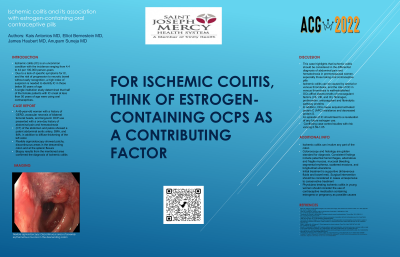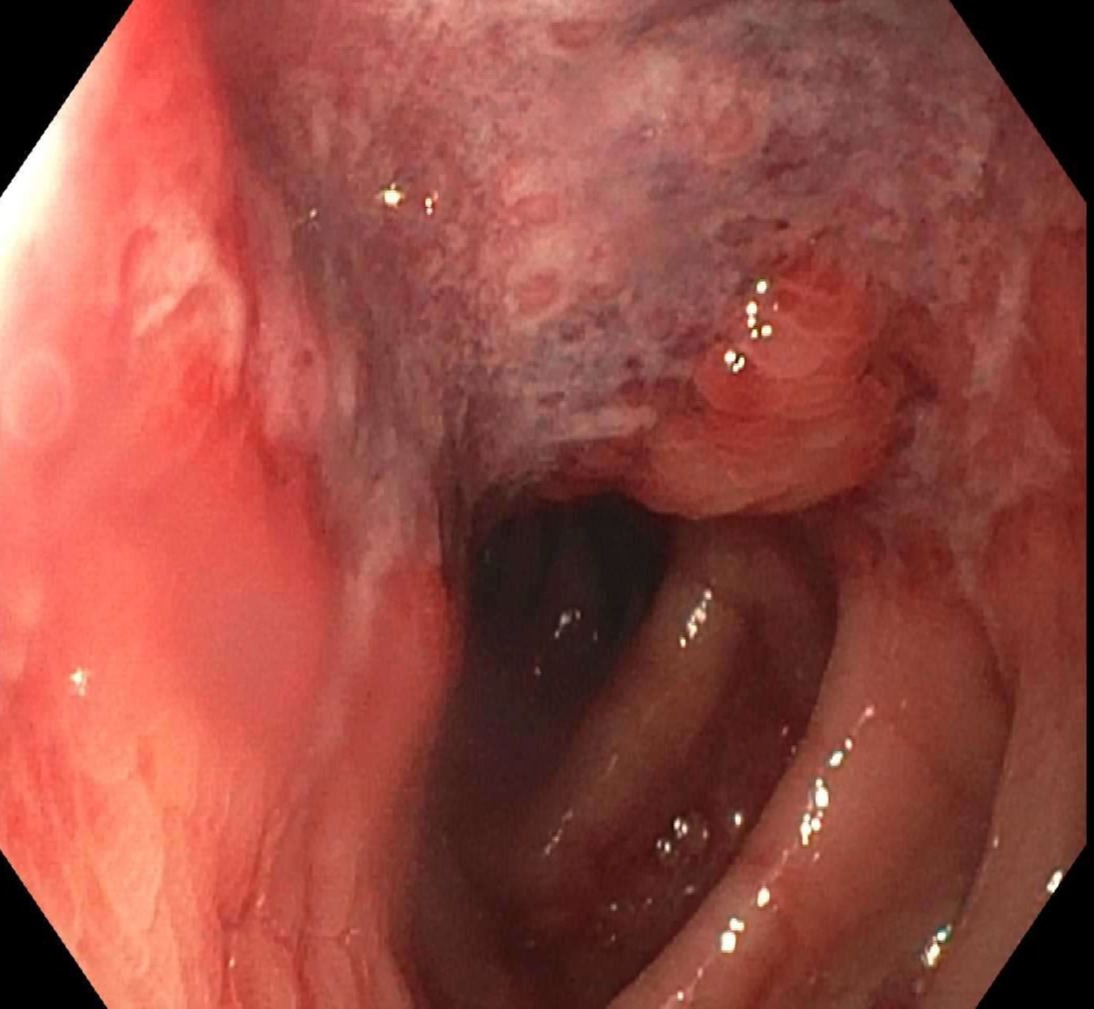Back


Poster Session B - Monday Morning
Category: Colon
B0120 - Ischemic Colitis and Its Association With Estrogen-Containing Oral Contraceptive Use
Monday, October 24, 2022
10:00 AM – 12:00 PM ET
Location: Crown Ballroom

Has Audio

Kais Antonios, MD
Saint Joseph Mercy Ann Arbor
Ann Arbor, MI
Presenting Author(s)
Kais Antonios, MD, Eliott Bernestein, MD, Anupam Suneja, MD, James Haubert, MD
Saint Joseph Mercy Ann Arbor, Ypsilanti, MI
Introduction: Ischemic colitis (IC) is an uncommon condition with the incidence ranging from 4.4 to 44 per 100,000 person-years. Due to a lack of specific symptoms for IC, and the risk of progression to necrotic bowel without early recognition, a high index of suspicion is needed to identify IC in those below 50 years of age. While occlusive or non-occlusive etiology may cause IC, the role of oral contraceptives (OC) as a risk factor is unclear with conflicting case-control studies suggesting risk varying from 0.59-1.05. A single-institution study determined that half of the female patients with IC onset at less than 50 years of age were using oral contraceptives.
Case Description/Methods: A 45-year-old woman with a history of GERD, avascular necrosis of bilateral femoral heads, and long-term combined estrogen and progesterone containing OC use presented with a one-day history of abdominal pain and blood in her stools. Computed tomography (CT) of the abdomen and pelvis showed a patent abdominal aortic artery, SMA, and IMA, in addition to diffuse thickening of the left colon, from the mid transverse colon through the sigmoid. Flexible sigmoidoscopy showed patchy, discontinuous areas in the descending colon and at the splenic flexure. Biopsy results from this area confirmed IC.
Discussion: This case highlights that IC should be considered in the differential of abdominal pain and blood in stools in premenopausal women. This is especially true in women before the 5th decade of life where spontaneous ischemic colitis is a disorder found almost exclusively in this population and is associated with the clinical use of exogenous estrogenic agents especially those taking OC. IC can be caused by arterial or venous thrombosis, and the role of OC in venous thrombosis is well-established. OCs affect plasma levels of procoagulant factors (VII, VIII, and IX), fibrinogen, prothrombin, anticoagulant, and fibrinolytic pathway proteins. In addition, OCs cause acquired activated protein C (APC) resistance and decreased protein S. Because of the altered hemostatic milieu, an episode of IC should lead to a revaluation of any future estrogen use.

Disclosures:
Kais Antonios, MD, Eliott Bernestein, MD, Anupam Suneja, MD, James Haubert, MD. B0120 - Ischemic Colitis and Its Association With Estrogen-Containing Oral Contraceptive Use, ACG 2022 Annual Scientific Meeting Abstracts. Charlotte, NC: American College of Gastroenterology.
Saint Joseph Mercy Ann Arbor, Ypsilanti, MI
Introduction: Ischemic colitis (IC) is an uncommon condition with the incidence ranging from 4.4 to 44 per 100,000 person-years. Due to a lack of specific symptoms for IC, and the risk of progression to necrotic bowel without early recognition, a high index of suspicion is needed to identify IC in those below 50 years of age. While occlusive or non-occlusive etiology may cause IC, the role of oral contraceptives (OC) as a risk factor is unclear with conflicting case-control studies suggesting risk varying from 0.59-1.05. A single-institution study determined that half of the female patients with IC onset at less than 50 years of age were using oral contraceptives.
Case Description/Methods: A 45-year-old woman with a history of GERD, avascular necrosis of bilateral femoral heads, and long-term combined estrogen and progesterone containing OC use presented with a one-day history of abdominal pain and blood in her stools. Computed tomography (CT) of the abdomen and pelvis showed a patent abdominal aortic artery, SMA, and IMA, in addition to diffuse thickening of the left colon, from the mid transverse colon through the sigmoid. Flexible sigmoidoscopy showed patchy, discontinuous areas in the descending colon and at the splenic flexure. Biopsy results from this area confirmed IC.
Discussion: This case highlights that IC should be considered in the differential of abdominal pain and blood in stools in premenopausal women. This is especially true in women before the 5th decade of life where spontaneous ischemic colitis is a disorder found almost exclusively in this population and is associated with the clinical use of exogenous estrogenic agents especially those taking OC. IC can be caused by arterial or venous thrombosis, and the role of OC in venous thrombosis is well-established. OCs affect plasma levels of procoagulant factors (VII, VIII, and IX), fibrinogen, prothrombin, anticoagulant, and fibrinolytic pathway proteins. In addition, OCs cause acquired activated protein C (APC) resistance and decreased protein S. Because of the altered hemostatic milieu, an episode of IC should lead to a revaluation of any future estrogen use.

Figure: Patchy, discontinuous areas of severely erythematous mucosa found in the descending colon and at the splenic
flexure
flexure
Disclosures:
Kais Antonios indicated no relevant financial relationships.
Eliott Bernestein indicated no relevant financial relationships.
Anupam Suneja indicated no relevant financial relationships.
James Haubert indicated no relevant financial relationships.
Kais Antonios, MD, Eliott Bernestein, MD, Anupam Suneja, MD, James Haubert, MD. B0120 - Ischemic Colitis and Its Association With Estrogen-Containing Oral Contraceptive Use, ACG 2022 Annual Scientific Meeting Abstracts. Charlotte, NC: American College of Gastroenterology.
